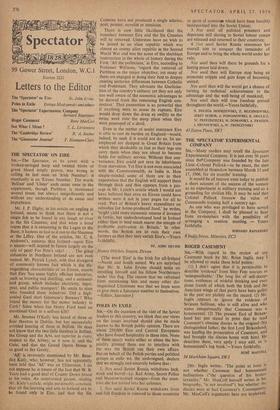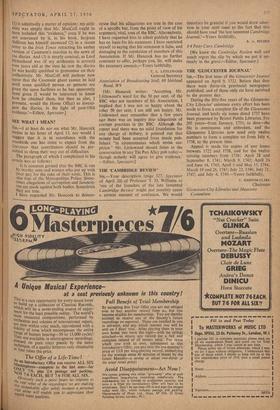ROGER CASEMENT SIR,—With regard to the review of mY Casement
book by Mr. Brian Inglis, may 1 be allowed to make these brief points:
(1) I don't agree that it is permissible to describe 'evidence' from Sinn Fein sources as `unimpeachable.' fhe long list of self-deceP- lions, evidences of wishful thinking and even pious frauds of which both the Irish and the American wings of that party have been guilty in the past are plainly on the record. (2) MI'• Inglis appears to ignore the evidence of Serjeant Sullivan, who is still alive and who states unequivocally that Casement was a homosexual. (3) The present Earl of Birken- head has just stated in print that he read Casement's obscene diaries in the original (his distinguished father, the first Lord Birkenhead. was leading the prosecution of Casement, and had brought the diaries home with him). describes them, very aptly I may add, as a homosexual's log book.'—Yours faithfully, [Mr. Inglis writes: 'The point at issue is not whether Casement had homosexual inclinations ("the question of his homo- sexuality," Mr. MacColl himself writes in his biography. "is not involved"), but whether the diaries were in fact Casement's. Consequently Mr. MacColl's arguments here arc irrelevant.
(1) is admittedly a matter of opinion: my criti- cism was simply that Mr. MacColl ought to have included this "evidence," even if he was not convinced by it, in his book. Serjeant Sullivan has himself answered (2) in a recent letter to the Irish Times retracting his earlier version of Casement's reaction to the news of the diaries. And (3) is simply comical; as Lord Ihrkenhead was (if my arithmetic is correct) nine years old at the time lie saw the diaries he was hardly qualified to pronounce on their authenticity. Mr. MacColl will perhaps now agree that the Casement ghost cannot be laid until some qualified person or persons are given the same facilities as be has apparently been given (I would be interested to know how he obtained them, but then so also, I presume, would the Home Office) to investi- gate the diaries, in the light of post-1916 evidence.'—Editor, Spectator.]











































 Previous page
Previous page